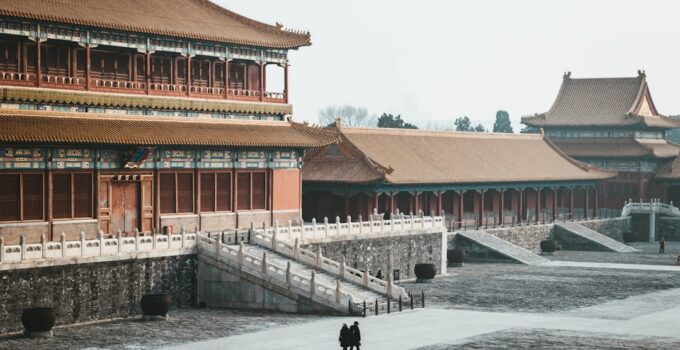The Cultural Revolution: A Period of Upheaval in China
The Cultural Revolution, which took place in China from 1966 to 1976, was a time of immense social, political, and cultural upheaval. Initiated by Mao Zedong, the Chairman of the Communist Party of China, the aim was to reassert his authority and purge perceived enemies within the party. This movement had a profound impact on Chinese society, leading to economic disruption, social turmoil, and the erosion of public trust in government and institutions. The reverberations of the Cultural Revolution also extended to the international arena, as Maoist ideology spread to other countries and affected China’s relationships with the broader world.
Summary:
– The Cultural Revolution stemmed from Mao Zedong’s power struggles and efforts to control the ideology within the Chinese Communist Party.
– The political campaigns of this period resulted in widespread political persecution and social upheaval, leaving a deep mark on Chinese society.
– The impacts of the Cultural Revolution spanned the economy, culture, education, and science in China.
– The mass movements and violence led to significant casualties and property damage.
– The Cultural Revolution’s effects included the destruction and rebuilding of culture, education, and scientific research, profoundly shaping Chinese society.
Origins of the Cultural Revolution
Mao Zedong’s motivations for initiating the Cultural Revolution were multifaceted. A key factor was his desire to regain control over the Communist Party, which he felt had become too bureaucratic and disconnected from its revolutionary roots. Mao envisioned that a mass movement led by the fervent young Red Guards could help him achieve this goal. The Red Guards, comprising students and young workers devoted to Mao and his vision for China, were encouraged to criticize and attack those they perceived as counter-revolutionaries or enemies of the state.
Political Movements during the Cultural Revolution
The Cultural Revolution was marked by intense power struggles within the Communist Party. Mao utilized the Red Guards and other youth groups to purge his political rivals and consolidate his own power. Many high-ranking officials were accused of being “counter-revolutionaries” or “capitalist roaders” and faced public humiliation, imprisonment, or even execution. The cult of personality surrounding Mao reached its peak during this time, with his image and writings being elevated to near-religious status.
Impact on Chinese Society
Indicator | Impact
— | —
Cultural Destruction | The destruction of cultural heritage and the disruption of cultural continuity
Regression in Education | The dismantling of the education system and the decline in educational standards
Social Turmoil | The breakdown of social order and the disruption of people’s livelihoods
Economic Stagnation | The hindrance of economic development and the loss of national wealth
Political Instability | The breakdown of the political system and the threat to political stability
The Cultural Revolution had a devastating impact on the Chinese economy, leading to a decline in productivity and output. Socially, it led to the breakdown of traditional values and social structures, with families torn apart and public trust in government eroded.
Mass Movements and Violence
The Red Guards played a central role in the violence and chaos of the Cultural Revolution. They were encouraged to attack and humiliate anyone they perceived as a threat to Mao’s leadership or the ideals of the revolution. This often included teachers, intellectuals, party officials, and those associated with the “old” society or traditional values. The violence perpetrated by the Red Guards was often brutal and indiscriminate, resulting in countless deaths, injuries, and acts of destruction.
Effects on Culture, Education, and Science
One of the primary goals of the Cultural Revolution was to eradicate what Mao saw as bourgeois or elitist culture and replace it with a revolutionary culture that promoted loyalty to the party and its leader. Intellectuals, artists, writers, and musicians were targeted as part of this campaign. Traditional education systems were dismantled, and scientific research and development also suffered during this time.
Leaders and Intellectuals
Mao Zedong and his inner circle, known as the Gang of Four, were the key leaders of the Cultural Revolution, wielding immense power and influence. Intellectuals played a complex role, with some supporting and participating in the movement, while others were targeted and persecuted for their perceived “bourgeois” or “counter-revolutionary” ideas.
Historical Evaluation and Reflection
The official Chinese government’s stance on the Cultural Revolution has evolved over time. Initially, it was portrayed as a necessary and positive movement, but in the years following Mao’s death, there has been a more critical evaluation of its legacy. Scholars and intellectuals have debated the long-term impact of the Cultural Revolution on Chinese society and politics, with differing perspectives on its significance and consequences.
International Impact
The Cultural Revolution had a significant impact on other countries around the world. Maoist ideology spread to various nations, influencing political movements and leading to social upheaval. China’s relationships with the international community were also affected, as the country became increasingly isolated and diplomatic relations were strained.
Significance and Legacy
The memory and commemoration of the Cultural Revolution continue to shape Chinese identity and politics today. The Chinese government has taken steps to suppress discussion and remembrance of the movement, fearing it could challenge the legitimacy of the Communist Party. However, ongoing debates and discussions among scholars and intellectuals about the legacy of the Cultural Revolution and its impact on Chinese society continue to unfold.
In conclusion, the Cultural Revolution was a tumultuous and transformative period in Chinese history, with far-reaching effects on the country’s society, politics, and culture. The violence, chaos, and lasting impact of this movement continue to be remembered and debated, serving as a reminder of the dangers of unchecked power, ideological extremism, and the suppression of intellectual and artistic expression.



